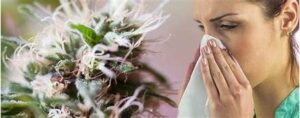Posted, Edited and Photos Added By Valkyrie Extractions Admin
Medically reviewed by Elizabeth Feuille, MD
Original Article Written by Kiara Anthony — Updated on August 17, 2022
- Symptoms
- Risk factors
- Diagnosis
- Prevention
- Outlook
Cannabis allergies have become more common in recent years. Although the plant is known for its anti-inflammatory properties, cannabis can cause a number of different allergy symptoms if it’s inhaled.
Cannabis is a plant used to create a euphoric high. It’s commonly used recreationally, although in recent years it’s become popular as a medicinal treatment for certain conditions.
Despite its reported benefits, cannabis is also an allergen that can trigger pollen-like allergy symptoms. Read on to learn more about cannabis allergy risk factors, diagnosis, and prevention.
Language matters

We use the term “cannabis” instead of “marijuana.”
We avoid the word “marijuana” because it has racist roots and connotations. The word “marijuana” first became popular in the United States during the cannabis prohibition movement, as it appealed to the widespread xenophobia against Mexican immigrants at the time.
Considering that members of historically marginalized races are more likely to be arrested for cannabis possession than their white counterparts, it’s especially important that we’re mindful about the language we use and how it can add to, or stem from, racist stereotypes.
Cannabis allergy symptoms

If you smoke and you have a weed allergy, you may experience:
- red eyes
- watery eyes
- hay fever
- runny nose
- congestion
- sneezing
- nausea
- vomiting
Cannabis allergies can also resemble contact dermatitis if the plant is tampered with or handled. In an older 2007 study evaluating cannabis allergy symptoms, a skin prick test revealed that cannabis can cause specific skin irritation. Some of the most common irritations include:
- itchiness
- inflamed, red skin
- hives
- dry, scaly skin
In more severe cases, an allergic reaction to cannabis can cause anaphylactic shock, a life threatening condition that causes your blood pressure to suddenly drop and your airways to close. If left untreated, a cannabis allergy could be fatal.
Risk factors of a cannabis allergy

Your body views allergens as a threat. While it works to protect against foreign bacteria and threats, your immune system will also cause a number of reactions or allergic responses. There are a few risk factors that could increase your likelihood of developing a cannabis allergy.
Allergen cross-reactivity
Cannabis allergies can become more prevalent if you’re allergic to a food or substance with similar protein properties. This is also called allergy cross-reaction. Some foods with similar allergen properties as the cannabis plant are:
- tomatoes
- peaches
- grapefruit
- almonds and chestnuts
- eggplant
- apples
- bananas
Sensitization
Increased cannabis exposure can also make you more likely to develop a sensitivity to the plant. This is more common in areas where cannabis is grown.
Pollen from the cannabis plant can trigger allergen symptoms. As a result, cannabis sensitization has increased since its legalization.
Increased THC content
Cannabis is dioecious, meaning that it grows male and female plants. Cannabis growers prefer female plants because their flowers produce THC and other psychoactive compounds.
Tetrahydrocannabinol (THC) is the chemical found in cannabis flowers that creates a euphoric high.
Growers isolate female cannabis plants from being pollinated in order to control the quality of the crop. When the female plant’s flowers come into contact with pollen from a male or hermaphroditic plant, seeds will develop. This lowers the quality of the flowers.
Female cannabis plants that are grown in isolation tend to have higher levels of essential oils and terpenes in their flowers. Although this is prized by growers, it could affect your sensitivity to the plant.
Diagnosing a cannabis allergy

In order to identify an allergy, a doctor or allergist can perform a skin prick test. This test can help you figure out whether or not you’re sensitive to a particular substance.
There’s currently no standard skin prick test for cannabis allergy, but a doctor or allergist may be able to prepare a test for you.
During this procedure, your doctor will prick your arm or back with a small amount of an allergen. If you’re allergic, your body may react and trigger an allergic response like swelling or itching within 15 to 20 minutes. If you aren’t allergic, you’ll probably show no symptoms.
But these tests are not perfect. Having a reaction during a skin test does not necessarily mean that you’ll have allergy symptoms when exposed to the substance in another context.
It’s also possible to be allergic to a substance but have a negative result (no reaction) on a skin test.
While blood tests like ELISA and RAST can help diagnose certain allergies, there’s no specific test to check for a cannabis allergy.
An IGE allergy test is a blood test that looks for signs of a general allergy response, not an allergy to a specific substance. It measures the total amount of IGE antibodies in your blood. Your IGE test result may help you find out if you have allergies in general, but it cannot tell you what’s causing your allergy.
In general, a blood test is considered a safer option for allergy testing because it comes with a lower risk of having a severe allergic reaction. But the options for cannabis allergy are not conclusive, and results aren’t available for several days.
Preventing an allergic reaction

The best way to prevent having an allergic reaction to cannabis is to avoid it. If you’re using medical cannabis, smoking it recreationally, or consuming edibles, doctors recommend you stop to avoid a severe reaction.
If you work with the cannabis plant regularly for work, doctors recommend wearing gloves, face masks, and using allergy medication to help reduce or prevent symptoms. Doctors also recommend carrying an inhaler in case the cannabis pollen affects your breathing.
Outlook
If you’ve become severely allergic to cannabis or if you begin to experience irregular breathing symptoms, visit your doctor’s office immediately.



